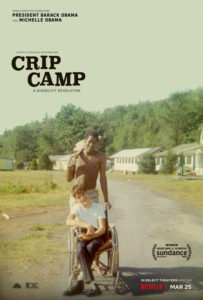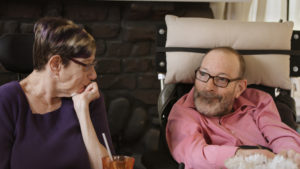Film Review: Beautiful “Crip Camp” Brings Tough Love
Written by: Christopher Llewellyn Reed | March 25th, 2020

Crip Camp (James Lebrecht/Nicole Newnham, 2020) 4 out of 4 stars.
What happens when the previously disenfranchised discover that they’re as deserving of equality and freedom as everyone else? Quite a lot of good, as it turns out, though the only people this fact might surprise are racial, gender and other supremacists. The more power we share in the world, the better that world becomes. And so we now have the stirring documentary Crip Camp, from directors James Lebrecht and Nicole Newnham (The Revolutionary Optimists), and Barack and Michelle Obama’s Higher Ground Productions, which tells the story of how one very special summer camp for differently abled people led to a wonder of changes in this country. It took some time and effort, but the 1960s and 1970s alums of Camp Jened – the “Crip Camp” of the title, in upstate New York – eventually took action that led to the passage of the Americans with Disabilities Act (ADA). This lovely movie pays apt tribute to their towering accomplishments.
Fresh off its January debut at the Sundance Film Festival, the film starts streaming today on Netflix. Filled with a wealth of fascinating archival material, Crip Camp begins with the arrival of the teenage Lebrecht – afflicted with spina bifida, he is subject as well as filmmaker – to Jened in the summer of 1971. Jealous of the kids who went to Woodstock a few years prior, he is overwhelmed (in a good way) by the hippyish colony that greets him at the camp. Soon, he is hip to all the ins and outs of the place, finding a girlfriend and making fast friends with fellow campers and counselors (some of whom are former attendees). Jened offered a nurturing community that allowed all who went there to develop their own, unique voices, liberated from their previous status as other. They became whole there, and went on to help others do the same.

Lebrecht is far from the only character. Foremost among the ensemble is Judith Heumann, who would later spearhead the protests and marches that led to the passage of the ADA. Though confined to a wheelchair (she suffered from polio most of her life), like many (including Lebrecht), she is a dynamo of brilliant, articulate energy, never stopping until she achieves the results she wants. Also in the film are Denise and Neil Jacobson, both with cerebral palsy, who met at camp and built a beautiful life together as partners and parents. Denise’s not inconsiderable speech impediment has not stopped her from getting a Ph.D. and establishing herself in the field of biostatistics and sex therapy. None of the people in the film are limited by what others might see as crushing disabilities. Lebrecht, himself, found work in his dream job as a sound designer, both in theater and in film, largely thanks to the confidence he built in Jened and the strong support network it created.

They lead and inspire by example, though their path is never easy. We follow them every step of the way, through the battles of the 1970s and 1980s as they pour into streets and occupy buildings to make the nation sit up and take notice. The directors combine their treasure trove of historical footage with interviews with the campers as they are today, sober and reflective, but also giddy as they recall how much fun they had as young folks living lives just like everyone else. In these deeply troubled times, a movie like Crip Camp is what we all need to remind us of the ties that bind us together as one beautiful human species.

